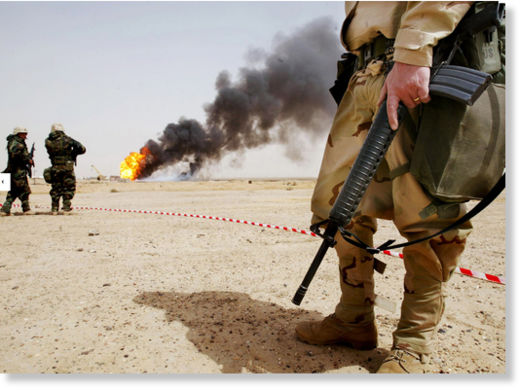Comment: Strangely, the author presents the idea of war being fought for oil as being promoted only, or primarily, by "conspiracy theorists". Yet this appears to be directly contradicted by several high level members of the US government, for example, who have candidly and publicly stated that the invasion of Iraq, for example, was indeed about oil.
Chuck Hagel, the current United States Secretary of Defense, while speaking at the Catholic University of America Columbus School of Law in 2008 stated: "People say we're not fighting for oil. Of course we are."
General John Abizaid, CENTCOM commander from 2003 until 2007, said of the Iraq war during a round table discussion at Stanford University in 2008, "Of course it's about oil, we can't really deny that."
According to academics from the Universities of Portsmouth, Warwick and Essex, foreign intervention in a civil war is 100 times more likely when the afflicted country has high oil reserves than if it has none. The research is the first to confirm the role of oil as a dominant motivating factor in conflict, suggesting hydrocarbons were a major reason for the military intervention in Libya, by a coalition which included the UK, and the current US campaign against Isis in northern Iraq.
Comment: What then, are we to make of the official reason for the NATO bombing on Libya: that it was to protect the Libyan people and stop Gaddafi bombing them?
It suggests we are set for a period of low intervention because the falling oil price makes it a less valuable asset to protect. "We found clear evidence that countries with potential for oil production are more likely to be targeted by foreign intervention if civil wars erupt," said one of the report authors, Dr Petros Sekeris, of the University of Portsmouth. "Military intervention is expensive and risky. No country joins another country's civil war without balancing the cost against their own strategic interests."
The report's starkest finding is that a third party is 100 times more likely to intervene when the country at war is a big producer and exporter of oil than when it has no reserves. "After a rigorous and systematic analysis, we found that the role of economic incentives emerges as a key factor in intervention," said co-author Dr Vincenzo Bove, of the University of Warwick. "Before the Isis forces approached the oil-rich Kurdish north of Iraq, Isis was barely mentioned in the news. But once Isis got near oil fields, the siege of Kobani in Syria became a headline and the US sent drones to strike Isis targets," he added.
The study, published in the Journal of Conflict Resolution, analysed 69 civil wars between 1945 and 1999, but did not examine foreign invasions. It noted that civil wars have made up more than 90 per cent of all armed conflicts since the Second World War and that two-thirds of these have seen a third-party intervention.
The researchers drew their conclusions after modelling the decision-making process of the third-parties' interventions. This assessed a wide range of factors such as their military power and the strength of the rebel army, as well as their demand for oil and the level of supplies in the target country. It found that the decision to intervene was dominated by the third-party's need for oil, far more than historical, geographic or ethnic ties.
The US maintains troops in Persian Gulf oil producers and has a history of supporting conservative autocratic states in spite of the emphasis on democratic reform elsewhere, the report says. However, the recent surge in US oil production suggests the country will be intervening less in the future - with China potentially taking up the role as lead intervener, the report suggests.




Reader Comments
to our Newsletter